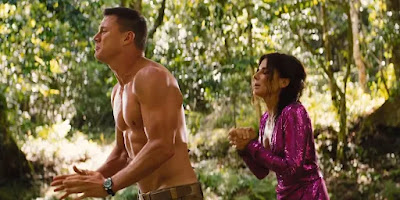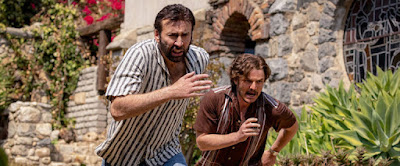Hey, it’s another sign of life for an endangered genre at the multiplex: an original romantic comedy. It’s an old-fashioned treasure hunt adventure, too. Three in one! The Lost City is a rare breed indeed, an original—in that it rips off its inspirations instead of remaking or rebooting or existing in the same cinematic universe as them—star-driven picture that coasts entirely on the charm of its leads. It stars Sandra Bullock, a beloved actress who made it big with romantic comedies returning to the genre after more than a decade away, as a beloved author who made it big with romance novels returning to publish after many years away. Neat trick, that. Unfortunately the comparison isn’t mined for much, as the movie’s instead interested in tromping through some familiar motions. The author’s popular series is best known for a cover model (Channing Tatum). When their joint book tour is quickly interrupted by a villainous billionaire (Daniel Radcliffe) kidnapping her thinking she can help him find buried treasure on a remote tropical island, the handsome lunk hopes to rescue her and prove he’s more than a pretty face.
Thus, we get Bullock and Tatum—also a welcome sight, having just returned to our screens with Dog a few weeks ago—traipsing through the jungle together. It’s Romancing the Stone with a blander coat of paint. The writer thinks highly of her cleverness, and the model is always a step behind but trying so admirably to think things through. He’s just slow on the uptake, and she’s slow to realize she’s falling for him. That old thing. Though the stars shine brightly, proving all over again why they were so appealing in the first place, the project’s way too blandly directed and formulaically scripted to ever really get off the ground. Car chases and shootouts hit their marks, and the banter is slathered on with a first-draft brush—then augmented with tons of off-screen ADR, the last refuge of filmmakers who’ve discovered far too late their scenes need more lines that almost sound like jokes. That’s all pretty pro-forma stuff, but the pretty island scenery and predictable melting of affections through a scampering adventure really do work at some basic level, if only for the charming Movie Stars enjoying the chance to do that increasingly rare thing.
A potentially far richer Movie Star text of a high-concept comedy is The Unbearable Weight of Massive Talent. Too bad it stays shallow. It stars Nicolas Cage as Nicolas Cage. He plays an actor who once won an Academy Award and starred in action blockbusters, but now a couple decades later fears he’s making nothing much of note. Does the actual Cage think that of his lesser direct-to-video efforts of late? (He still gets the occasional wild pitch lead in a hallucinogenic horror movie like Mandy or a taciturn indie drama like Pig.) The film makes some effort to be about the idea of Cage more than the true man himself. His wife (Sharon Horgan) and daughter (Lily Sheen) in the picture are nothing like his real-life family. And his professional frustrations seem to be responding more to a tabloid image than anything real. (He’s fittingly haunted by a waxy de-aged ghost of his younger self.) But of course, if any actor would play a loose self-portrait balancing image maintenance with gentle self-critique it would be Cage. After all, he’s the one who describes his own process leading to wild and unpredictable performances in everything from Moonstruck to Face/Off as “experimenting with what I would like to call Western Kabuki or more Baroque or operatic style of film performance. Break free from the naturalism…” As for if he goes over the top, he once said: “You tell me where the top is and I’ll tell you whether or not I’m over it.”
The movie has a fun hook anyway, even if it eventually loses the fun. Cage is hired to attend the birthday party of a Spanish oligarch (Pedro Pascal). Once there he discovers he’s fast friends with the guy. Too bad, then, that the CIA recruits the actor to spy on his host. The movie’s then bifurcated between pleasant and appealing buddy comedy—Cage humbly cedes most of the charm to Pascal’s giddy enthusiasms, while he provides the thawing reaction shots and sweet-natured stumbling—and a painfully generic action picture. The bad guys are stock types, the chases and explosions are flat, and the mystery is a stop-and-start nothing. Whole subplots are dropped or elided at times, too, with some comic relief suddenly turning up dead and others disappearing for large swaths of run time. This is almost certainly a movie hacked apart at some point in its development. It leans way too hard on its meta winks without going all the way into speculative loop-de-loops a la Being John Malkovich’s head-spinning. Why quote the great Con Air theme song in the opening scene if not bringing it back in a rousing encore by the end? And why make a movie in love with Cage movies without engaging in what makes them great? Or what makes any movie great, for that matter? Early on it has a character disparage being “forced” to watch silent classic Cabinet of Dr. Caligari as it gave them “anxiety” to dislike it, and it’s later a sign of character growth when another learns to love Paddington 2 without much reasoning. This results in an oddly small movie, so in love with its star’s willingness to play himself that it forgets to do anything with that willingness. It needed someone behind the camera who’d be as willing to go hurtling over the top with him.



No comments:
Post a Comment